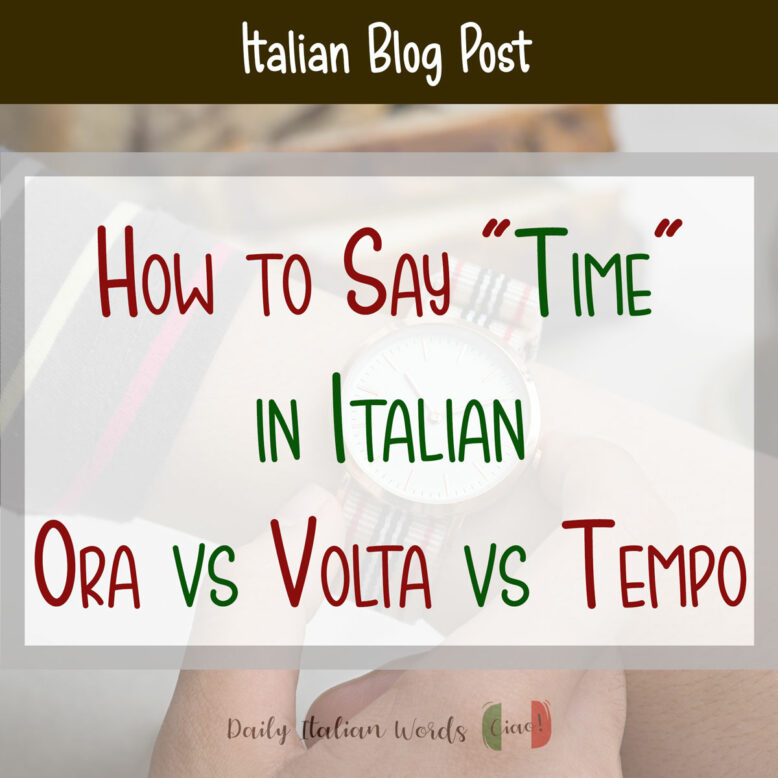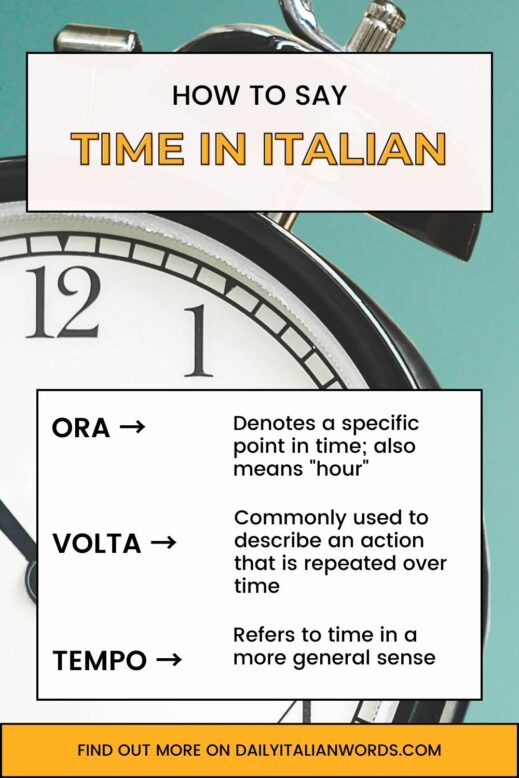Expressing the concept of time in Italian can be a rather challenging task for non-native speakers. While English has just one word to talk about this essential element of everyday language, in Italian there are at least three different terms you can use depending on the context: ora, volta, and tempo.
These words can’t be used as synonyms because there’s a big difference between them – except in one case that I’ll reveal later. So, let’s take a look at their specific meanings and how we use them.

How to say “time” in Italian: Ora
Ora is the most common way to say “time” in Italian. In its literal sense, it means hour, and is mainly used to talk about a specific point in time, like:
- Che ora è? (What time is it?)
By the way, we also use the plural form – ore – to tell the time in Italian:
- Che ore sono? (What time is it?)
Likewise, we use ora to ask what time something is going to take place, for instance:
- A che ora è la partita? (What time is the game?)
There’s also the expression è ora di… (it’s time to…) that’s used when referring to a particular occasion, such as:
- È ora di aprire quella bottiglia di vino (It’s time to open that bottle of wine)
- È ora di andare a letto (It’s time to go to sleep)
Furthermore, we often use ora to mean “now” as a synonym for adesso. Here’s an example:
- Dai, ora andiamo a casa! (Come on, let’s go home now!)
Finally, ora is part of an idiom that’s frequently used in Italian – non vedo l’ora – which means I can’t wait / I’m looking forward to. For example:
- Non vedo l’ora che arrivi l’estate (I’m looking forward to summer)
- Non vedo l’ora di vederti (I can’t wait to see you)

How to say “time” in Italian: Tempo
To refer to time in a more general sense, the Italian word to use is tempo. Take these examples:
- Il tempo vola quando siamo insieme (Time flies when we are together)
- Hai tempo per un caffè oggi? (Do you have time for a coffee today?)
- Mi dispiace ma non ho avuto il tempo di chiamarti (I’m sorry, I haven’t had time to call you.)
Tempo can also be used to talk about the duration of an activity or event – in other words, something that’s measurable. Say for example:
- Quanto tempo ci vuole per arrivare a casa tua? (How long does it take to get to your house?)
- Per quanto tempo deve cuocere il tacchino? (For how long does the turkey need to cook?)
In addition, tempo expresses our go-to topic when we’re at a loss for how to continue a conversation: the weather! Here are a couple of examples:
- Oggi il tempo è proprio bello! (Today’s such a beautiful day!)
- Ultimamente il tempo è davvero brutto (We’ve had some bad weather lately)
Last but not least, there are a whole bunch of Italian expressions that revolve around the word tempo. These include:
- Molto tempo fa (A long time ago)
- Tempo libero (Free time)
- A tempo perso (As a pastime)
- Tempo al tempo (Be patient)
- Ai vecchi tempi (In the olden days)

How to say “time” in Italian: Volta
Volta is another way to say time in Italian. This word (and its plural, volte) is commonly used to discuss an action that’s repeated over time. For example:
- Quante volte al mese mangi fuori? (How many times a month do you eat out?)
- Quante volte sei stato in Italia? (How many times have you been to Italy?)
Here are some possible answers:
- Qualche volta (Sometimes)
- Molte volte (Many times)
- Poche volte (Few times)
- Una volta (Once)
- Due volte (Twice)
Volta (or volte) often appears with other words in expressions of time such as:
- La volta scorsa (Last time)
- Prima volta (First time)
- Un’altra volta (Again)
- C’era una volta (Once upon a time)
- Poco alla volta (Little by little)
Keep in mind that when you’re talking about an undefined past, volta is synonymous with tempo. For example:
Una volta / Un tempo le cose erano diverse (Things used to be different at one time)
And finally, volta is also the right Italian word to describe something that’s an opportunity or chance:
- È la volta buona (It’s the right moment / time)

The Italian language has a seemingly endless supply of words, so if you want to express something as basic as time, you have to think about the context in order to use the right word. But by following these tips, you’ll be well on your way to talking about time in Italian with confidence and ease!

Valentina is a travel writer in love with her country. Having travelled widely around the globe, she realised there was more to explore closer to home and decided to put the passport aside for a while. You can follow her adventures around Italy on her blog myitaliandiaries.com.

Valentina Nicastro is a travel writer in love with her home country, Italy. Having travelled widely around the globe, she realised there was more to explore closer to home and decided to put the passport aside for a while. When she is not immersed in documenting Italy, you’ll find her donning her communication consultant hat, weaving words as a content writer and bridging linguistic divides as a translator.


